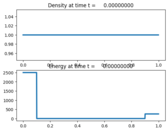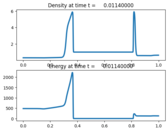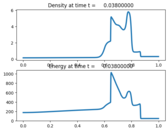#!/usr/bin/env python
# encoding: utf-8
r"""
Woodward-Colella blast wave problem
===================================
Solve the one-dimensional Euler equations for inviscid, compressible flow:
.. math::
\rho_t + (\rho u)_x & = 0 \\
(\rho u)_t + (\rho u^2 + p)_x & = 0 \\
E_t + (u (E + p) )_x & = 0.
The fluid is an ideal gas, with pressure given by :math:`p=\rho (\gamma-1)e` where
e is internal energy.
This script runs the Woodward-Colella blast wave interaction problem,
involving the collision of two shock waves.
This example also demonstrates:
- How to use a total fluctuation solver in SharpClaw
- How to use characteristic decomposition with an evec() routine in SharpClaw
"""
from clawpack import riemann
from clawpack.riemann.euler_with_efix_1D_constants import *
gamma = 1.4 # Ratio of specific heats
def setup(use_petsc=False,outdir='./_output',solver_type='sharpclaw',kernel_language='Fortran',tfluct_solver=True):
if use_petsc:
import clawpack.petclaw as pyclaw
else:
from clawpack import pyclaw
if kernel_language =='Python':
rs = riemann.euler_1D_py.euler_roe_1D
elif kernel_language =='Fortran':
rs = riemann.euler_with_efix_1D
if solver_type=='sharpclaw':
solver = pyclaw.SharpClawSolver1D(rs)
solver.time_integrator = 'SSP33'
solver.cfl_max = 0.65
solver.cfl_desired = 0.6
solver.tfluct_solver = tfluct_solver
if solver.tfluct_solver:
from clawpack.pyclaw.sharpclaw import euler_tfluct1
solver.tfluct = euler_tfluct1
solver.lim_type = 1
solver.char_decomp = 2
from clawpack.pyclaw.sharpclaw import euler_sharpclaw1
solver.fmod = euler_sharpclaw1
elif solver_type=='classic':
solver = pyclaw.ClawSolver1D(rs)
solver.limiters = 4
solver.kernel_language = kernel_language
solver.bc_lower[0]=pyclaw.BC.wall
solver.bc_upper[0]=pyclaw.BC.wall
mx = 800;
x = pyclaw.Dimension(0.0,1.0,mx,name='x')
domain = pyclaw.Domain([x])
state = pyclaw.State(domain,num_eqn)
state.problem_data['gamma'] = gamma
if kernel_language =='Python':
state.problem_data['efix'] = False
x = state.grid.x.centers
state.q[density ,:] = 1.
state.q[momentum,:] = 0.
state.q[energy ,:] = ( (x<0.1)*1.e3 + (0.1<=x)*(x<0.9)*1.e-2 + (0.9<=x)*1.e2 ) / (gamma - 1.)
claw = pyclaw.Controller()
claw.tfinal = 0.038
claw.solution = pyclaw.Solution(state,domain)
claw.solver = solver
claw.num_output_times = 10
claw.outdir = outdir
claw.setplot = setplot
claw.keep_copy = True
return claw
#--------------------------
def setplot(plotdata):
#--------------------------
"""
Specify what is to be plotted at each frame.
Input: plotdata, an instance of visclaw.data.ClawPlotData.
Output: a modified version of plotdata.
"""
plotdata.clearfigures() # clear any old figures,axes,items data
plotfigure = plotdata.new_plotfigure(name='', figno=0)
plotaxes = plotfigure.new_plotaxes()
plotaxes.axescmd = 'subplot(211)'
plotaxes.title = 'Density'
plotitem = plotaxes.new_plotitem(plot_type='1d')
plotitem.plot_var = density
plotitem.kwargs = {'linewidth':3}
plotaxes = plotfigure.new_plotaxes()
plotaxes.axescmd = 'subplot(212)'
plotaxes.title = 'Energy'
plotitem = plotaxes.new_plotitem(plot_type='1d')
plotitem.plot_var = energy
plotitem.kwargs = {'linewidth':3}
return plotdata
if __name__=="__main__":
from clawpack.pyclaw.util import run_app_from_main
output = run_app_from_main(setup,setplot)



